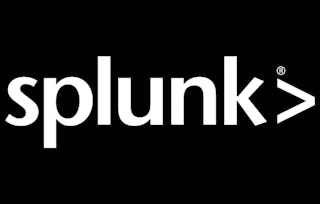Take the next step in your knowledge of Splunk. In this course, you will learn how to use time differently based on scenarios, learn commands to help process, manipulate and correlate data.

Splunk Search Expert 102
Seize the savings! Get 40% off 3 months of Coursera Plus and full access to thousands of courses.

Splunk Search Expert 102
This course is part of Splunk Search Expert Specialization

Instructor: Splunk Instructor
4,832 already enrolled
Included with
50 reviews
What you'll learn
Filter data using time modifiers and time commands and use formatting functions to accommodate various time formats.
Calculate statistics using transforming commands and mathematical and statistical eval functions.
Compare, manipulate, and normalize data using several commands including the all-powerful eval command and an array of functions.
Enrich results with lookups and subsearches to correlate and filter data from multiple sources.
Skills you'll gain
Tools you'll learn
Details to know

Add to your LinkedIn profile
5 assignments
See how employees at top companies are mastering in-demand skills

Build your subject-matter expertise
- Learn new concepts from industry experts
- Gain a foundational understanding of a subject or tool
- Develop job-relevant skills with hands-on projects
- Earn a shareable career certificate

There are 5 modules in this course
Earn a career certificate
Add this credential to your LinkedIn profile, resume, or CV. Share it on social media and in your performance review.
Instructor

Offered by
Explore more from Security
 Status: Free Trial
Status: Free TrialSplunk Inc.
 Status: Free Trial
Status: Free TrialSplunk Inc.
 Status: Free Trial
Status: Free TrialSplunk Inc.
Why people choose Coursera for their career

Felipe M.

Jennifer J.

Larry W.

Chaitanya A.
Learner reviews
- 5 stars
76%
- 4 stars
16%
- 3 stars
6%
- 2 stars
2%
- 1 star
0%
Showing 3 of 50
Reviewed on Feb 16, 2022
Really comprehensive and detailed. Amazing amount of learning. Thank you for providing this opportunity to learn.
Reviewed on Aug 21, 2023
Excellent slides and narration. Awesome hands-on walk-throughs. Very thorough.

Open new doors with Coursera Plus
Unlimited access to 10,000+ world-class courses, hands-on projects, and job-ready certificate programs - all included in your subscription
Advance your career with an online degree
Earn a degree from world-class universities - 100% online
Join over 3,400 global companies that choose Coursera for Business
Upskill your employees to excel in the digital economy


